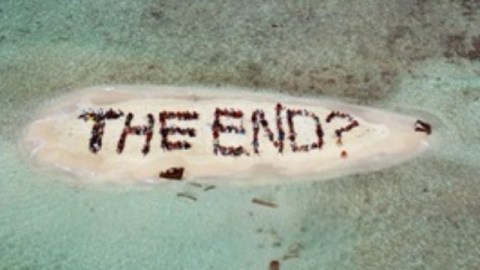Restarting the Conversation about Ocean Acidification: How To Frame What Is At Stake?

Last week, Simone Lewis-Koskinen contributed a valuable guest post on the communication challenges facing scientists and leaders hoping to elevate public concern over ocean acidification. In a follow-up post today, she examines the frames of reference that might widen public participation on the issue. Ms. Lewis-Koskinen is a graduate student in this semester’s course on “Science, the Environment and Media”— MCN.
Ocean acidification is one of the many eNvironmental issues to have been subsumed by the broader ‘climate change’ debate, posing a myriad of communication challenges and opportunities. In a previous post, I discussed the potential ramifications of framing ocean acidification as a climate change issue given the successes and failures of the movement. Here, I argue which frames are likely to aid communication efforts..
Focusing on strategic dimensions of ocean acidification will facilitate the uptake of information, deepen public understanding and compel policy action. Framing is used to define and shape an issue by emphasizing certain elements that enhance the audience’s connection to and understanding of the material (Nisbet, 2009). For science communicators, frames may be used “to turn partial and fragmented scientific knowledge into streams of knowledge claims that are useful to the practice of decisions” (Berkhout, 2010). Effective framing devices for ocean acidification should therefore acknowledge the issue as regionally relevant with profound socioeconomic implications to best align the issue with audience interest and inspire further action. As such, communicators should focus on three key areas when developing appropriate frames:
ECONOMY
“Substantial revenue declines, job losses, and indirect economic costs may occur if ocean acidification broadly damages marine habitats, alters marine resource availability, and disrupts other ecosystem services” (Cooley & Doney, 2009).
Economic interests appeal to a diverse range of individuals across sectors, beliefs and political parties. As a highly valued, widely shared interest, public opinion prioritizes economic growth over environmental protection (Saad, 2010).. Framing ocean acidification as an economic concern could transcend the limitations of the ‘special interest’ environmental label by linking risk-related information with the more tangible, economic outcomes of ocean acidification. Emphasizing the projected revenue loss to commercial fisheries could provide a relevant, quantifiable metric by which ocean acidification could be measured and communicated within a broadly applicable economic framework. Presenting the issue as a direct threat to the maritime economy would strongly resonate with a wide audience, connectingconcern over the current economic situation to ocean acidification increasing public interest and policy action.
Of particular relevance to ocean acidification, an economic frame should link impacts to maritime economies. As the most highly traded food product (Smith et al., 2010), seafood is of great social and economic importance, contributing $225 to $240 billion annually to the global economy (Dyck & Sumaila, 2010). Aquaculture in particular is the fastest growing animal food-producing sector, growing by 6.9 percent per year (FAO). Studies suggest ocean acidification will negatively impact a range of commercial seafood species, effecting growth factors including metabolism, reproduction, development, intraceullular chemistry and immunity (Cooley & Doney, 2009). The success and future of these fisheries are fundamentally contingent upon healthy, viable species.
Applying an economic frame focused on the survival of the fisheries industry could integrate ecosystem and social dimensions to instigate what scholars call policy ‘inertia’ (Charles, 2007). By shifting the focus away from the ‘environmental’ frame and onto the economic implications, communication efforts could engage a set of highly influential and prolific industry players with a vested interest in the preservation of fish populations.
INDIVIDUAL IDENTITY
“Non-scientists including representatives from government, business, and nongovernment organizations, as well as social scientists, are considered important participants [in expert advisory processes] because they can enhance the credibility and political relevance of the scientific conclusions while indicating how society will respond to them.” (Bocking, 2006)
Individuals receive, interpret and respond to information relative to their social, cultural and personal experiences and beliefs (Brossard & Lewenstein, 2009). Sociocultural framing can help reduce the scientific complexity of the issue and hone in on specific parameters of interest that the audience can readily identify with (Wynne, 1992b) such as impacts for the present and future fisheries. Given the projected negative impact on the shellfish industry (NOAA, 2008), focusing communication efforts on threats relating to the social and cultural implications for fishing communities could help integrate individual identity with the science of ocean acidification.
In practice, future communication efforts should be tailored to the specific social and cultural dimensions of the target demographic. Profiling community opinion leaders could appeal to an audience who might otherwise be skeptical of science and/or the scientific community by featuring a familiar, trusted source. For example, coastal campaigns could feature oyster fisherman as spokesmen, framing the issue within recognizable, relevant dimensions (e.g. threat to livelihood). Community representatives could help draw attention to ocean acidification as an issue of concern while emphasizing values that guide policy action. Akin to the National Geographic I Am the Ocean campaign, communication strategies could profile different representatives across sectors to broaden the appeal and accessibility of the frame.
LOCAL EMPHASIS
“Studies suggest that underscoring the links between local events and climate change may encourage deeper engagement with the issue and foster a greater desire to take action to mitigate potential impacts.” (Weber, 2006)
Understanding that ocean acidification is a global epidemic whose effects are not always immediately or directly felt, referencing regional or local implications allows the audience to better understand and identify with the issue through personal experience. Researchers suggest that emphasizing the linkages between local events and environmental issues can be used to increase concern for and action around the given issue (Spenceet al, 2011). Focusing on local events channels the community’s local knowledge and sense of ownership (Millennium Ecosystem Assessment, 2005), building support for mitigation and adaptation strategies. Discussing ocean acidification within a local context, i.e. the changing ocean chemistry and composition of coastal communities, could stimulate a greater sense of stewardship and concern.
Studies suggest that underscoring the links between local events and environmental issues may encourage deeper engagement with the issue and foster a greater desire to take action to mitigate potential impacts (Weber, 2006). Highlighting the projected regional impacts of ocean acidification, particularly within coastal fishing communities, could facilitate understanding and interest in the issue, thereby increasing willingness to support policy action. Communication efforts should therefore target regional media outlets to provide local coverage, relating the otherwise abstract scientific concepts to effects that are already and/or potentially soon to be felt within the community. Communicators could explain regional changes in ocean chemistry through the economic and/or identity frames, engaging community opinion leaders to discuss threats to the locally relevant fisheries and community livelihoods.
–Guest post by Simone Lewis-Koskinen, an MS student in Environmental Science at American University.
This post is part of the course “Science, Environment, and the Media” taught byProfessor Matthew Nisbet in the School of Communication at American. See also other posts on the climate change debate by Lewis-Koskinen and members of her project team.





